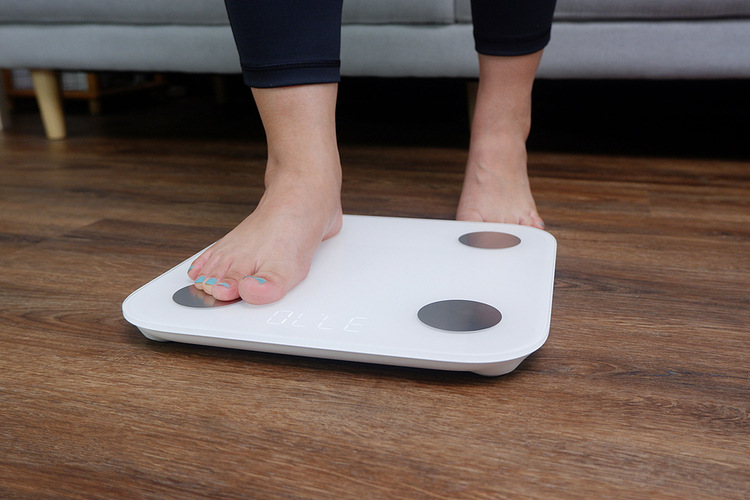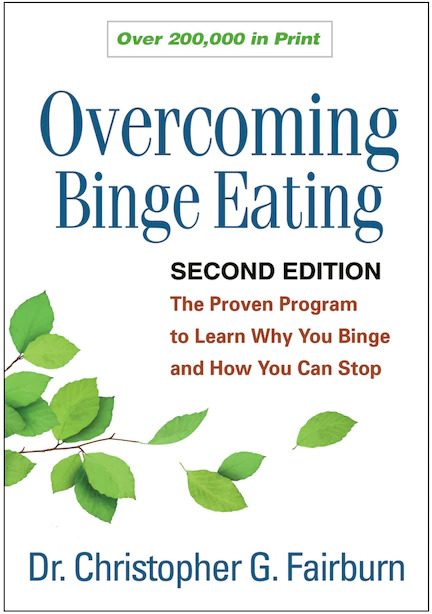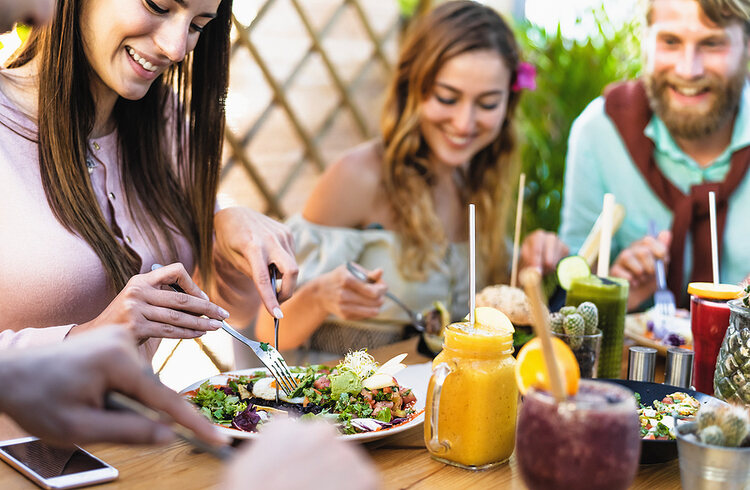|
Getting your Trinity Audio player ready...
|
After a long week of working and following a strict diet, you’re probably craving a treat. So, when you enter the breakroom and find a box of donuts left out, there’s no doubt they’ll be calling your name. But after eating one (or maybe two), you feel terrible for what you’ve done. In this post, I’ll explain food guilt, the harm it can cause, and how to practice guilt-free eating.
What is Food Guilt?
Food guilt is when you feel negative emotions after eating certain foods, typically when they’re high in calories, carbs, or fat. Eating disorders often come with shame around particular foods and how much is eaten. But even without having an eating disorder, people can feel guilty about what they eat.
Food guilt is driven into us due to societal beliefs of what health is, how thin you should be, and what foods to avoid. No matter where you are, it’s hard to steer clear of unwanted advice about our bodies and the food we eat.
Because society focuses so much on how we look rather than holistic health, the obsession with dieting is everywhere. This has led to the rise in “guilt-free” food recipes and products. In reality, all foods should be guilt-free for us to take care of our total well-being.
Why You Shouldn’t Feel Food Guilt
The emotions we feel around food can dictate our mental wellness. Negative emotions around food can make eating out and making plans stressful. This can lead to isolation, which keeps us from having healthy, supportive relationships. If the guilt around eating gets strong enough, it can even cause an eating disorder.
When we think we’re doing something wrong, we can develop a poor self-image. This can lead to depression, anxiety, and other mental illnesses. When dealing with shame, we’re likely to go back to the same harmful behaviors because we believe we deserve punishment.
You can also get caught in a binge and restrict cycle because of restrictions on guilt food. Restrictions make eating a healthy diet unbearable and make you want to quit. People don’t stay on fad diets for long because they try unsustainable ones to lose weight fast. Banning yourself from eating the foods you love will only make you crave them more.
Lastly, food guilt can stop you from getting enough nutrition. As humans, we need to eat a wide variety of foods to get the nutrition we need. Giving yourself too many food restrictions will limit your ability to nourish your body well. If you’re eating too little, it can also lead to weight loss plateaus.
How To Practice Guilt-Free Eating
The best thing you can do to stop feeling food guilt is not label food as bad or good. Instead, think of food as more nutritious or less nutritious. For instance, a bowl of fruit is more nutritious than a bag of chips. After that, make sure you’re eating more nutritious foods often while still enjoying the other foods.
Allow yourself to feel your cravings and hunger and learn to honor them. If you want to eat something, take a portion of it and leave the rest. Let yourself enjoy it without feeling guilty. Part of healthy eating is being able to enjoy food, including ones that are lower in nutrition and high-calorie.
Be proud of how much you nourish your body each day. Remember that restrictions lead to overeating and disordered eating. Allow yourself to eat something when you want it, so you don’t get strong urges to overeat. This will keep you sane while trying to eat healthier.
For example, I make healthy changes to my diet while still eating the foods I like in moderation. When I want a cupcake, I’ll eat a cupcake, and not a gluten-free, sugar-free version. Also, if someone is nice enough to bring me an unexpected treat, I enjoy it without allowing myself to feel ashamed for doing so. I finally feel like food doesn’t control me anymore.
Protecting Your Emotional Wellness
If you find a certain food harder than others to eat without feeling guilty, take it in small steps. Portion out an amount that you think will be acceptable and allow yourself to enjoy it. Take note of how you feel while letting yourself eat it. Journaling can help you get your feelings out.
When you feel shame, consider what’s causing the feelings. Is it because of something someone told you, or you heard about that particular food? Is the feeling caused by diet culture, saying you shouldn’t eat a certain food group or ingredient?
Instead of obsessing over your physical appearance, shift your focus to your mental and emotional wellness. Working toward a better self-image will go a long way to remove any food guilt you have. Positive self-talk and self-affirmations can help as well.
Also, don’t allow anyone to pick at the way you choose to eat. Surround yourself with supportive people who don’t see the need to bring others down. If necessary, find someone to work with who can help you heal your thoughts around food. Learning to eat without letting food have power over you is an amazing feeling.
"Fitness for me is wellness. It means being healthy – mentally and physically." – Suniel Shetty Click To TweetEnding Food Guilt: Final Thoughts
Food guilt is defined by having negative feelings about the food you’ve eaten. Having these feelings can disrupt your emotional wellness and lead to disordered eating. It’s best to stop labeling foods as good or bad and practice guilt-free eating.
Remember, what the diet industry tells you isn’t meant to make you healthy. Rather, they want you to feel bad about yourself, so you feel the need to improve. This is how they sell their products. Food recommendations from your doctor or dietician are much more valuable.
In the end, allowing yourself to eat the foods you love will keep you from feeling deprived. I’m living proof that you can still drop to a healthy weight while doing so. Finding a way to nourish your body sustainably is the best way to go.
Do you have any foods that you feel guilty about after eating? Let me know in the comments!
That’s it for now everyone. If you’ve found some value in this post, please share it to inspire others too! Thanks!

Facebook | Twitter | Instagram | Pinterest
This post contains affiliate links for products that I love. If you use these links to buy something I may earn a commission with no additional cost to you. Thanks for helping keep this site going! Also, this post was made for the site Lose Weight With Ang. If you’re reading this on a different site, please email us https://loseweightwithang.com/contact/
References:
https://www.clearviewtreatment.com/blog/5-ways-shame-can-shape-life/
Do You Have Trouble with Overeating?
Are you struggling with food and looking to rid your life of dieting for good? Thinsanity by Glenn Mackintosh is a book that teaches readers how to eat intuitively, set clear goals, and allow weight loss to happen naturally.
If you haven’t read Thinsanity, I highly recommend it! Learn how to stop letting food control you and lose weight for the last time. For more information on what the book teaches, you can check out a full review here.
Click below for quick links to the book on Amazon!





I think people living in “blue zones” that are really healthy and living for ages make good role models. It doesn’t sound like they’re wasting time feeling guilty about food; they’re enjoying it.
Learning to enjoy the food you eat sounds like part of a healthy life for sure. Even if the food is not perfectly nutritious.
Absolutely.
Ang, great post. I have rule of thumb that if I eat too many carbs at one meal or a dessert, then I need to just make-up for it by eating salad at the next one. These pre-mixed and washed salads are ideal for one person salad meals. Don’t sweat it, just make up for it. Keith
Hey Keith! Even if someone doesn’t have the chance to make ip for their eating, they should never feel guilty for what they’ve eaten. Although, eating a balanced diet is certainly recommended 🙂
Ang, true. They should not, but often do. Keith
I would sign up for the Brain Academy but I don’t think I can figure out how it works. Kind of like when I was signed up for a Time Management seminar and couldn’t fit it into my schedule! 😂
Actually, sounds really interesting, and I look forward to your reports on what YOU learn. That’ll probably be more than my brain can handle anyway. 😉 c.a.
Nice 😂 It’s been pretty cool so far
Super post! I have to bookmark it to remind myself of the things I do that are unhealthy. And, then what I can do to make things better. Thank you for this contribution!
Thanks! I’m glad you liked it 😊
Pingback: The Binge Code: A Full Book Review - Lose Weight With Ang
Pingback: When Does Healthy Eating Become a Diet? - Lose Weight With Ang
Pingback: Diet Culture: What It Is And How To Ignore It - Lose Weight With Ang
Pingback: How to Use a Hunger and Fullness Scale - Lose Weight With Ang
Pingback: Thinsanity by Glenn Mackintosh: A Book Review - Lose Weight With Ang